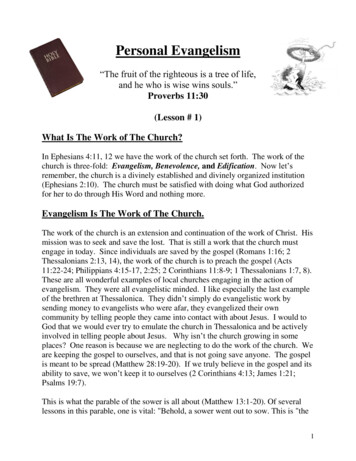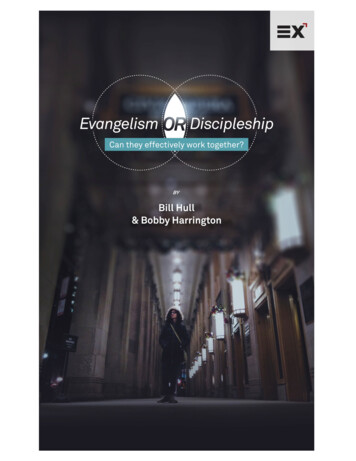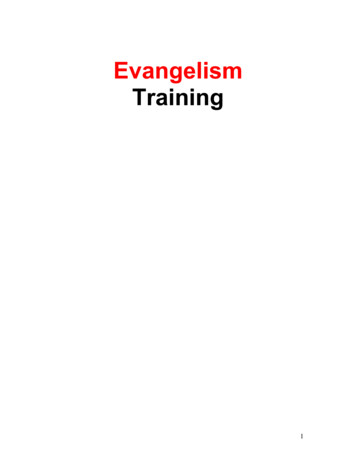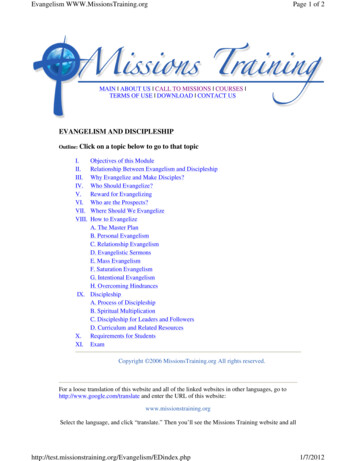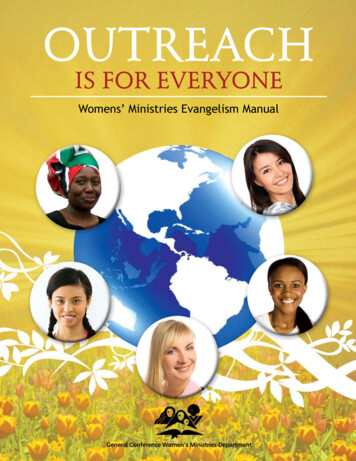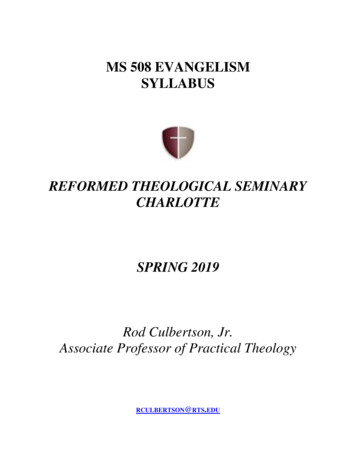
Transcription
child sponsorship, evangelism, and belongingin the work of World Vision ZimbabweERICA BORNSTEINUniversity of California, IrvineIn this article, I examine the child sponsorship program of World Vision Zimbabwe—offering perspectives from nongovernmental organization (NGO)employees, sponsors, sponsored children, and rural communities being assisted. I demonstrate how transnational processes of giving and membershipin a global Christian family contrast with Zimbabwean interpretations of humanitarian assistance and efforts to initiate a Zimbabwean child sponsorshipprogram amidst growing local inequalities. In effect, new perceptions of economic disparity are produced by the very humanitarian efforts that strive toovercome them. I explore the intimate and personal relationships encouragedby sponsorship and the political economies within which they are situated,which include jealousies, desires, and altered senses of belonging. [Africa,NGOs, humanitarianism, transnationalism, development, Christian evangelism,Zimbabwe]This is a study of the paradoxical effects of Christian humanitarian programs ofchild sponsorship. Nongovernmental organizations (NGOs) involved in child sponsorship seek to transcend economic disparity via personal relationships between individuals in "developed" nations and the children they sponsor in "less-developed" nations. These organizations speak to the potential of eradicating poverty, improvinglives spiritually and economically, and uniting sponsors and sponsored children in aninternational community. The paradox lies in that, as much as these efforts inspire aliberatory potential, they also accentuate localized experiences of poverty and transform relationships of belonging for sponsors, the children they sponsor, and employees of the NGOs. The results of such efforts are indeed ambiguous. The liberatory potential to link people and transcend inequality on a global scale occurs in localpolitical economies that reinforce the very disparities that sponsorship aims to overcome. This is not to say that humanitarian aid is a hopeless task, but that it is a multidimensional process that must be understood in such a spirit.In this article, I investigate the dual consequences of child sponsorship throughan analysis of one religious NGO, World Vision in Zimbabwe. I frame my analysiswith the narrative experiences of two men in their twenties—a Zimbabwean who wasformerly a child sponsored by World Vision and a Canadian sponsor who visited thechild he sponsored in rural Zimbabwe. The cases educe how evangelical narratives ofchild sponsorship simultaneously transcend difference and exacerbate it—producingunintended consequences for both sponsors and their children. Culled from a largerproject focusing on Christian NGOs and the relationships between religious ideas andeconomic development in Zimbabwe, my focus on World Vision arises from researchI conducted in World Vision's offices (in California 1994-95, in Washington, D.C.American Ethnologist 28(3):595-622. Copyright 2001, American Anthropological Association.
596american ethnologist1998, and in Harare and at rural field sites in Zimbabwe 1996-97). The cases are notintended to draw conclusions as to the efficacy of sponsorship. I have not set out toevaluate World Vision as an NGO (whether it is good or bad, for example); I believethis is a job best served by experts trained in assessing rural development and perhapsby World Vision itself. Rather, I aim to move beyond binary moral categories.Through ethnographic analysis of the inner-workings of World Vision, I focus on howhumanitarian NGOs link donors and recipients of aid to facilitate processes of givingand helping. My entry into this topic was World Vision itself, and it is the locus of thisstudy. My research in Zimbabwe was conducted with religious NGOs (loosely defined to include donors and constituents as well as NGO staff), in NGO offices, and atproject sites where rural development takes place. In this article, I explore relationships of child sponsorship that form the core of World Vision's evangelical theology. Ialso document efforts by World Vision Zimbabwe (hereafter WV Zimbabwe) to makechild sponsorship a local practice, with Zimbabwean sponsors for Zimbabwean children. As Christianity and rural economic development struggle to put down localroots, to "indigenize" in Zimbabwean parlance, or "inculturate" in the language ofmission texts and theology (Bediako 1995; Pobee 1992; Sanneh 1989), I inquire howthese processes take place and why they have not been successful. Although in Zimbabwe the Christianity of World Vision has become "Zimbabwean," its humanitarianism—as reflected in programs of child sponsorship—has not yet become a localized charitable form.World Vision, like many other NGOs involved in programs of rural agriculturaldevelopment, initiates microenterprise development schemes, irrigation projects, andsanitation programs that may include drilling boreholes for clean drinking water,building pit latrines, and constructing buildings for primary school education. There isan enormous body of literature that has emerged to examine the role of NGOs in economic development (Fisher 1997 among others).1 World Vision is set apart from othertransnational organizations in that it is explicitly Christian and attributes much of itswork to Christian principles defined in a set of core values that express institutionalethics and the character to which it aspires.2 Although religious discourse structuresthe activities of the NGO, the Christian aspect of World Vision may or may not alterits effects, especially when compared to secular NGOs. World Vision is also distinguished from other NGOs by its primary source of funding—child sponsorship:monthly remittances sent from individuals in "developed" nations to children in "developing" nations such as Zimbabwe. Sponsorship is organized through an apparatusof offices that form World Vision's International Partnership. Donor offices in placessuch as the United States fund development projects through national offices inplaces such as Zimbabwe. Structurally, the NGO is a transnational network of officesin which donor offices communicate directly with national offices without the coordination of a central office.3 In 1997, World Vision as a transnational organizationclaimed to "touch the lives" of more than 61 million people through 4,279 projects in94 countries (World Vision 1997c).4 That same year, individuals in the United Statessent monthly remittances of US 22 each to sponsor 526,694 children around theworld. In Zimbabwe, where my research was conducted, over 30,000 children aresponsored by an estimated 26,000 individual sponsors overseas (including, but notlimited to, the United States). The majority of resources for the development work ofWV Zimbabwe come from child sponsorship.5Economic development in southern Africa has deeper historical roots than therapidly emerging field of NGO studies may suggest. World Vision is a contemporary missionary organization, an institutional space that has a long history in Zimbabwe—
child sponsorship597certainly longer than NGOs. Most Christian and secular NGOs in Zimbabwe begantheir operations during the liberation struggle in the 1970s. Many came after independence to assist in the transition to African rule and to resettle refugees from thewar. World Vision and all of the NGOs that I studied in Zimbabwe share this history;however, they also tread the paths of economic development established before themby missionary organizations. Scholars have noted that one should not be misled to believe that NGO activity and the economic development it supports is a radically newform of transnational capital (Cooper and Packard 1997). Moreover, missionary activity is well documented in Zimbabwe, and there is extensive documentation of churchbodies as leaders of education, health care, and social welfare in colonial SouthernRhodesia (Bourdillon 1977; Dachs 1973; Ranger 1994; Rea 1962); the role of religionin Zimbabwe's struggle for independence (Hallencreutz and Moyo 1988; Lan 1985);and the postindependence response of churches to economic development(Chepkwony Ongaro 1991; Gundani 1988; Maxwell 1995). Other scholars havetraced intricate relations between missionaries and national governments in southernAfrica both in and out of the colonial era (Comaroff 1989; Comaroff 1991; Cooperand Stoler 1989; Gifford 1992; Hastings 1979; Ranger 1962). Missionaries are aliveand well in southern Africa today; they are involved in internationally sponsored programs of rural economic development and are Zimbabwean employees of NGOssuch as World Vision. Much like mission bodies of earlier eras, transnational Christian NGOs struggle to fulfill expectations from donor offices and to contend with thelocal contexts in which their work is conducted (for the colonial era, see Comaroffand Comaroff 1997; for contemporary contexts, see Moyo and Katerere 1991;Ndegwa 1994; Riddell and Robinson 1995; Vivian 1994). It is in this regard thatChristian NGOs are similar to so-called secular NGOs concerned with issues of transparency, accountability, governmentality, and the most efficient use of donor funds toalleviate poverty.6 Even development activity that is not explicitly religious may alsobe seen as having deeper roots in the religious ethic of Christianity, where advancement and betterment through service are an integral aspect of religious discourse.the liberatory potential of sponsorship: global Christian familiesThe personal relationships of child sponsorship, built through correspondence,exist alongside the impersonality of the monetary exchange of child sponsorship—theSimmelian fact (1990) that these relationships are being purchased, through globalcapitalism, reinscribing those who have money to sponsor children and those whomust be sponsored (although many of the sponsors are not wealthy in the context oftheir own national economies. Most sponsors are pensioners or "middle class").7 Thepersonal connection—from individual to individual in relationships of correspondence—both effaces the global political-economic context that engenders sponsorship and transcends the potential impersonality of a monthly remittance. If thesesponsored children threaten to become commodities, embodying the commodification of goodness and development and fetishized as such, the relationships of belonging to one's own nation and to an imagined global community, reaffirm generic humanity in the process. Discourses of evangelism build relationships of childsponsorship within World Vision, transmogrifying money in the form of monthly remittances—a generic and impersonal standard of value—into embodied human relationships with alive, unpredictable, and spontaneous others.Child sponsorship involves monthly remittances sent from sponsors, throughWorld Vision, to children sponsored in countries such as Zimbabwe. These monthlypayments finance World Vision's economic development at rural project sites.
598american ethnologistSponsorship also involves rural communities that elect management committees tooversee development projects and, in concert with local leadership (such as eldersand headmen), "identify the poorest families in the community."8 The children identified are sometimes those who have lost a parent or whose parents are economicallymarginal relative to the rest of the community.9 At project sites, sponsorship lasts between 1-10 years and is only one component of World Vision's broader developmentinitiatives in health, sanitation, education, and microenterprise development— initiatives that also engage the families of children who are not sponsored. Sponsorshipmonies fund these broader initiatives as well; monthly remittances sent by sponsorsare aggregated in donor offices in the nations where sponsors reside and pooled together to budget community development. In contrast to other development organizations that also facilitate rural, agricultural development, the relationships createdthrough child sponsorship, between sponsors and their children, form personal linksacross national borders and cultures (World Vision 1997b).World Vision's publicity materials describe child sponsorship as a humanitarianconnection that manifests transcendent love for a stranger. In effect, humanitarianglobal capitalism spawns relationships across space and facilitates an intercontinentaltraffic in meaning (see also global ecumene in Foster 1991; Hannerz 1987, 1996).Child sponsorship connects sponsors in "developed" nations with children in "developing" nations through late-capitalist and transnational forms of accumulation. In aprovocative essay on transnational accumulation and shifting class relations in theUnited States, Rouse exemplifies how transnational accumulation is made distinctiveby the increased speed with which "people, goods, money, information and ideasmove across the boundaries of the state" (1995:358). The speed and flow of capitalcorrelates to growing inequalities and shifting class positions within the global sphere,often in local arenas. These processes are augmented by a prevalence of organizations such as World Vision. Crossing national boundaries and coordinating fiscalflows of humanitarian aid, NGOs encourage ideas of helping and humanitarianism,redistributing transnational accumulation. New forms of accumulation (and humanitarian redistribution) that promise to "shrink the distances between humanity" offernarratives with liberatory potential to unify people across national borders (Rouse1995:376).10My first case is an example of what sponsorship can do for a child being sponsored. I met Albert in Zimbabwe in 1997.11 A man in his twenties who as a boy hadbeen sponsored by World Vision in rural Zimbabwe, he was described to me by thestaff of WV Zimbabwe as a sponsorship success story. The national director urged meto meet with Albert to "see what sponsorship can do." When I met Albert he was doing well, financially, by Zimbabwean standards. Dressed smartly in a pink shirt andtie, he arrived at the World Vision offices in Harare in a company car and suggestedwe go to his office at a local shopping center. During our interview, he attributed hiscurrent success to having been sponsored as a child and recounted how difficult lifewas for him at the time his sponsorship began. Albert was one of the poorest of thepoor and had been chosen by his community to be sponsored. He had grown up indifficult circumstances: his mother had died when he was very young, and his grandmother raised him. When his grandmother died, he moved in with his father, his father's second wife, and his new stepbrothers and stepsisters. He was not well liked byhis stepmother and remembered sponsorship coming when he was feeling "letdown," as if the "Lord had turned his back." Albert saw World Vision's arrival in thecommunity as a rescue and a blessing. He said, "Then came the sponsor and everything looked up. . . . The Lord came to my rescue in the form of a sponsor, and He
child sponsorship599was there as a provider. It was a great blessing." Albert had fond memories of beingsponsored, although it had been difficult for him to understand the logic of childsponsorship at the time. He described sponsorship as being in the dark and beinghanded a light, as "a great help from nowhere." He had joined the World Vision program during a family relief and supplementary feeding initiative in 1982 at the age often. His memories of the time were vague, but he recalled having "lots of milk on Friday." He explained how the sponsored children would come together every fortnightto meet and have Bible lessons at the Methodist church. "I remember the milk," hesaid, "then there was washing soap, beans, and other things to share with my family";it was a time of abundance.World Vision told Albert at the time that he would receive letters and presents,and that a sponsor promised to see him through school. In addition to the food andcorrespondence, sponsors sent money to their children that World Vision translatedinto gifts purchased locally, such as soccer balls. It was hard for Albert to grasp what itmeant. "How can someone who doesn't know me come and take care of me?" hewondered. "They never met me, yet they are saying how much they love me. It was abit difficult to believe." There were set times to write letters to sponsors. He addressedhis letters "Dear Sponsor" since he did not know his sponsor's name, gender, or country of origin, although he suspected his sponsor was from the United States. Albert'ssponsor was truly anonymous. The letters he received were translated into Shona and,since the pronouns were gender neutral, he never knew if his sponsor was male or female. The cards he received from his sponsor were on World Vision stationery withthe corners ripped off where addresses had been. For Albert, being sponsored madehim feel important. "Personally, it felt great," he said, "really felt like I was belonging,that I am a part of this person's life." He remembered the thrill of being sponsored. "Iremember lots of luxury cars and lots of important people coming to see the children. . . Important cars made us feel important. We felt we are very privileged. [Theywere] important people in suits and ties and we felt special." Sadly for Albert, however, World Vision phased out the program in 1987 in order to promote the self-sufficiency of the community. He was not told directly that the project was coming to anend. "They just closed up the offices," he explained. He considered it a phase in hislife, a chapter that ended. When the project closed, he lost contact with his sponsor.He described it as a "feeling of loss" without the fortnightly meetings or the gifts. Albert experienced World Vision's initiative of self-sufficiency as abandonment.Suddenly, in 1989, after five years without any contact from his sponsor, Albert'ssister received a call from World Vision asking for Albert to come to the World Visionoffices in Harare. He recounted how, in Harare, a World Vision staff member had toldhim he was a very lucky child and that his sponsor had sent him a lot of money:US 550. Albert said that after five years without any contact with his sponsor hecould barely understand it. The sponsor sent enough money for secondary school inHarare, which Albert had never hoped to attend since his father could not afford theschool fees. If Albert failed his O-levels, his sponsor wanted him to repeat them; if hepassed, his sponsor wanted him to take his A's. The 550 would pay for two years ofhigh school, for uniforms, and for Albert to come to Harare for his secondary school.12He lost contact with his sponsor after this final remittance, and at the time we spokehe was trying to locate his sponsor. He regretted that he never had a chance to thankhis sponsor in person and sponsorship had ended so abruptly. "I am optimistic," Albert said to me. "Somewhere in the files, they must have something about the sponsor's identity."
600american ethnologistAlbert's stepsisters and brothers did not benefit to the extent that Albert did fromsponsorship, and this created jealousy within his family. When she heard about theextra funds Albert received from his sponsor for school fees, his stepmother was upset.She had gone with him to Harare to accept the money, and she could not believe thatit was only Albert who was to receive it; she wanted him to share the money with hisstepbrothers and sisters. Albert recalled how the sponsor relations specialist in Hararehad to explain to his stepmother what sponsorship meant and why the extra moneywas just for Albert. Despite local attempts to translate the discourse of child sponsorship into the Zimbabwean context, child sponsorship had the propensity to becomean individualizing force. The individualistic discourse in the developed world, whichgenerates the success of individual-based appeals, created conflict in Albert's life,and, according to Albert, the tremendous gift of an education for Albert made his father feel inferior and suspicious. As our interview was ending, Albert surprised mewith a question: "Do you think there are ulterior motives behind humanitarian aid?"he asked. His father was concerned with these motives and their link to colonialism.Albert said of his father: "He told me that after I finish school I shouldn't accept anymore money from World Vision. He said the sponsor will send you money for an airplane ticket to the United States, and then you will never come back. They probablycan't have their own children and they will want to adopt you. He was afraid of having me stolen."Although the work of World Vision created a division between Albert and hisstepbrothers and sisters, it opened up the world for Albert. He eventually went to theUniversity of Zimbabwe and saw himself as someone who wanted to help others—tobe more "Christian." He was forlorn that he could not find his sponsor and that thewindow of an international community closed after the project support ended. Alberthad changed, but the "belonging" had stopped. Instead, he was connected to something new and intangible—an urge to do humanitarian work himself. Albert had adream of working for World Vision—to "translate my gratitude so some kid will lookup at me and say that man helped me be who I am." He wondered whether the realbenefactors of child sponsorship, the people who benefit the most from humanitarian,charitable work, were the sponsors themselves. He imagined what could be gainedby sponsorship—that "sense of being you feel by knowing you did something forsomeone." He too wanted this sense of being, to "be involved with the welfare of others," not only for his family or for himself, "but other people because we are just onebig family." Yet, in Albert's case, child sponsorship reformed his local identity, placing it in transnational counterpoint to local tensions and conflicts, instead of constituting a unified global (and in this case, Christian) world. Albert experienced a stress between his local family and his perceived sense of place in a global Christian andhumanitarian community.relationships of correspondenceAlthough the humanitarian community is created by fiscal flows from "developed" to "less developed" countries, relationships move reciprocally between sponsors and their sponsored children. Journalists are fond of critiquing child sponsorshiporganizations for their misuse of funds or for corrupt and inefficient developmentpractices. For example, a series of articles in the Chicago Tribune entitled "The Miracle Merchants" (1998) lambasted four organizations for corrupt practices. Fortunately for World Vision, it was not chosen for the focus of the expose. This exposehighlights the concern that results when global efforts to connect people result in failure—when children once involved in a program can no longer be located, for example.
child sponsorship601Although the four organizations were critiqued for an abuse of donor funds, or lack of"stewardship" (Irvine 1996:273) for money, I argue that global disjunctures on anemotional level are just as significant. In child sponsorship, children are not only ambassadors of hope (Malkki 1997), but they symbolize explosive moral terrain. Critiques of child sponsorship represent children as embodying both hope (of international assistance) and despair (when it does not come to fruition).Authors (Stephens 1995; Zelizer 1985) have pointed to the importance of studying the social processes through which children are constructed (and deconstructed)as social and historical categories. Zelizer underscores the historical processes thatsacralized children in a definitive shift from economic to emotional value, concluding that contemporary conceptions of morally valued, nonlaboring but economicallypriceless children are modern phenomena. Stephens and the authors in her editedvolume, Children and the Politics of Culture, examine postmodern contexts to arguethat the "child" as a modern category is being eroded by global disjunctures, including war and the economic consequences of globalization and flexible accumulation(cf. David Harvey 1989).Malkki (1997) extends this argument to examine discursive representations ofchildren in the international community. She argues that international discourses ofhumanitarianism that equate children with hope for the future stand in contrast to history and politics. Children, as incarnations of Utopia in humanitarian discourse, serveas depoliticizing agents in highly political contexts. By exploring the role of being human in the world community and the role of children as manifestations of this humanitarianism, Malkki argues that transnational representations of children do notnecessarily transcend the national; they may depend on it. In the supranational imaginings of a world community, the world is an ensemble of nations and children areseen to embody all of humanity. In effect, Malkki argues, children serve the international humanitarian community as embodiments of basic goodness and symbols ofworld harmony, as sufferers, as seers of truth, as ambassadors of peace, and as embodiments of the future. Children are a "tranquilizing convention," a depoliticizingagent in the international community (Malkki 1997:17). One could argue that newforms of transnational accumulation engender the consumption of "goodness" andhumanitarian ideals while, simultaneously, children increasingly are interpellated asconsumer subjects (Rouse 1995).In contrast to the representation of children as universal and depersonalized,World Vision's child sponsorship offers the potential for highly personalized and intimate relationships of friendship and membership in families. On July 3, 1997, inHarare, during a focused group discussion with the Christian Witness Committee ofWV Zimbabwe (which I attended), the national director of WV Zimbabwe gave amoving example of the depth of these relationships in practice, describing a sponsorwho lost a photo of his child:A sponsor in the States had their wallet stolen, and there was a picture of the sponsored child in it. And they really cried, you know. They didn't know how much theywere attached to this child that they sponsored, and it was really moving. They missedthe other credit c rds and so, b u t . . . the point of the deprivation was the picture andthe picture of the grandmother of the sponsored child. Now, this is a good powerfulstory because it's drawing attention to relationships of people. And to me it has neverceased to amaze me how there is such a strong bond with people who have neverseen each other. It's more than the terms in which we explain it. . . . It's mysterious . . .because otherwise, you see, we can't explain all this inhumanity and despair.13
602american ethnologistThus, not only are children tranquilizing agents, they are also panaceas for such unexplainable human consequences as "inhumanity and despair." Through personal relationships, as in child sponsorship, the poverty constituting the "need" for developmentbecomes manageable and pragmatic, something to be solved with a monthly financialcommitment. For the national director of WV Zimbabwe, these "relationships of people" are a powerful component of the development work of World Vision. Organizations like World Vision reinforce the category of childhood—to protect innocentchildren and their sponsors from the harsh conditions of global economic shifts andthe injustices that situate some in "developed" and others in "developing" nations.These relationships carry contradictions and ambiguities, proffering what Ferguson(1999) has called "global disconnect" (cf., "disjunctures"; Appadurai 1990) along withthe Christian unity they profess. There is a severe gap between the desires producedthrough transnational accumulation and the realities experienced. Amidst unity, andpromises of connection, difference is reinscribed and inequalities increase. For sponsors, humanitarian expectations of a transnational family juxtapose the prospect of loss—a child that cannot be found, for example, or harsh realities of poverty ("inhumanityand despair," as the national director articulated) that define the urgency of development and humanitarian aid.In Harare, I interviewed local managers of child sponsorship, such as specialistsand correspondence analysts, who monitored the reciprocal correspondence between sponsors and their children. On one occasion, I was invited to the sponsor relations room and offered an opportunity to read mail from sponsors to their children. Although the context did not allow for rigorous content analysis of letters and packages,I was struck by how each letter was simultaneously mundane (with the bland and superficial descriptions of everyday life and the weather) and intensely intimate and personal (about children and grandchildren, husbands and wives, vacation travel, sickpets)—all communicated from distant countries to Zimbabwe. Some sponsor packages contained toys. As I opened the envelopes, I could feel the exoticism of something from far away. I could imagine how excited a child in rural Zimbabwe might beto receive a paint set, a toy car, a coloring book, or even a photo of a family in Canada, Germany, or the United States. The subjects in these portraits emerged as exoticand personal partners in the one-to-one relationship of intimate correspondence, theessence of child sponsorship.Letters were intensively catalogued and edited by correspondence analysts whocut out the names of sponsors as well as anything relating to politics or sexuality (bothto exclude content inappropriate in the Zimbabwean context and to allow World Vision to operate in a space set apart from local and national politics, in effect, to betransnational). Because children were prohibited from soliciting money directly fromsponsors, sponsored childre
through child sponsorship, between sponsors and their children, form personal links across national borders and cultures (World Vision 1997b). World Vision's publicity materials describe child sponsorship as a humanitarian connection that manifests transcendent love for a stranger. In effect, humanitarian


